Table of Contents
ToggleIntroduction
Explore AI’s role in enhancing early disease detection and diagnosis in healthcare for better patient outcomes
Millions of lives are lost every year because detecting the diseases takes a lot of time, but AI disease detection work perfect.
From analyzing complex medical images in seconds to predicting health risks before symptoms appear, AI in healthcare is changing how doctors USE AI disease detection technology.
Imagine a system that spots cancer cells with greater accuracy than the human eye or an algorithm that warns a diabetic patient years before they start. These breakthroughs are no longer futuristic dreams; they are now happening in hospitals, research labs, and clinics around the world.
In this article, we’ll explore how AI disease detection such as machine learning, predictive analytics, and medical imaging are reshaping modern diagnostics. You’ll learn how AI helps detect diseases earlier, enhances decision-making for healthcare professionals, and improves patient outcomes.
By the end, you’ll understand why AI-driven early diagnosis isn’t just improving healthcare; it’s saving lives and defining the future of modern medicine.
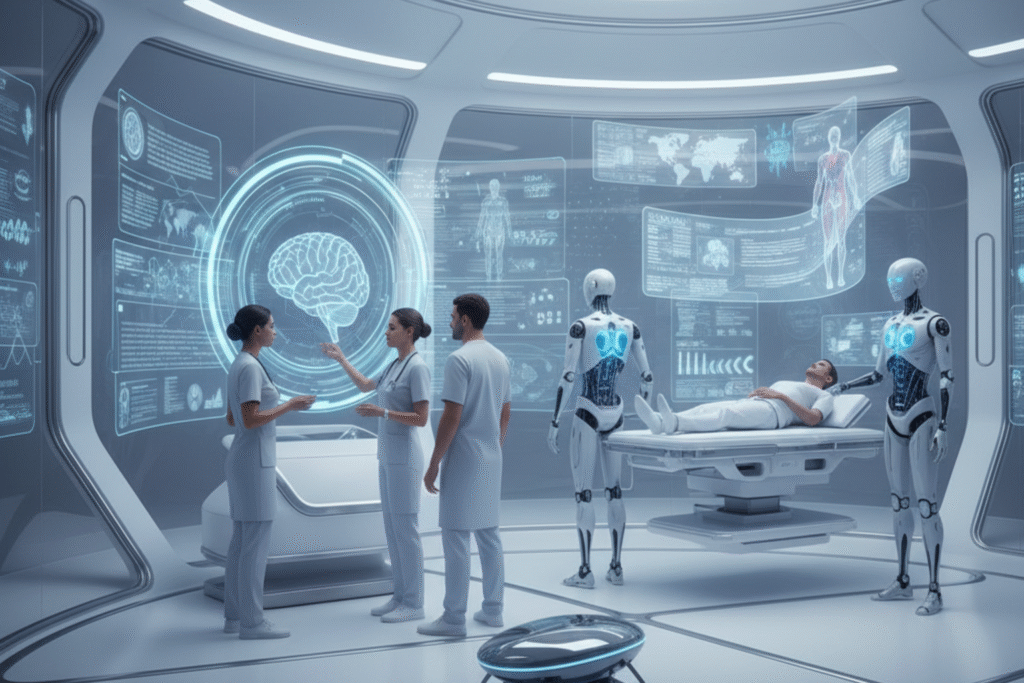
The Role of AI disease detection in Modern Medical Diagnostics
Artificial Intelligence AI has become a crucial partner in modern healthcare. By combining machine learning algorithms, predictive analytics, and medical data processing, AI enables doctors to detect diseases at much earlier stages than ever before.
Unlike traditional diagnostic methods, which rely heavily on human interpretation, AI systems can analyze thousands of data points from blood tests to MRI scans in just seconds. AI in healthcare doesn’t replace human expertise; it amplifies it. With automated image analysis, pattern recognition, and clinical decision support, AI allows physicians to focus more on patient care while improving the accuracy and speed of diagnosis.
How AI disease detection Earlier Than Humans Can.
Machine Learning Models for Early AI disease detection
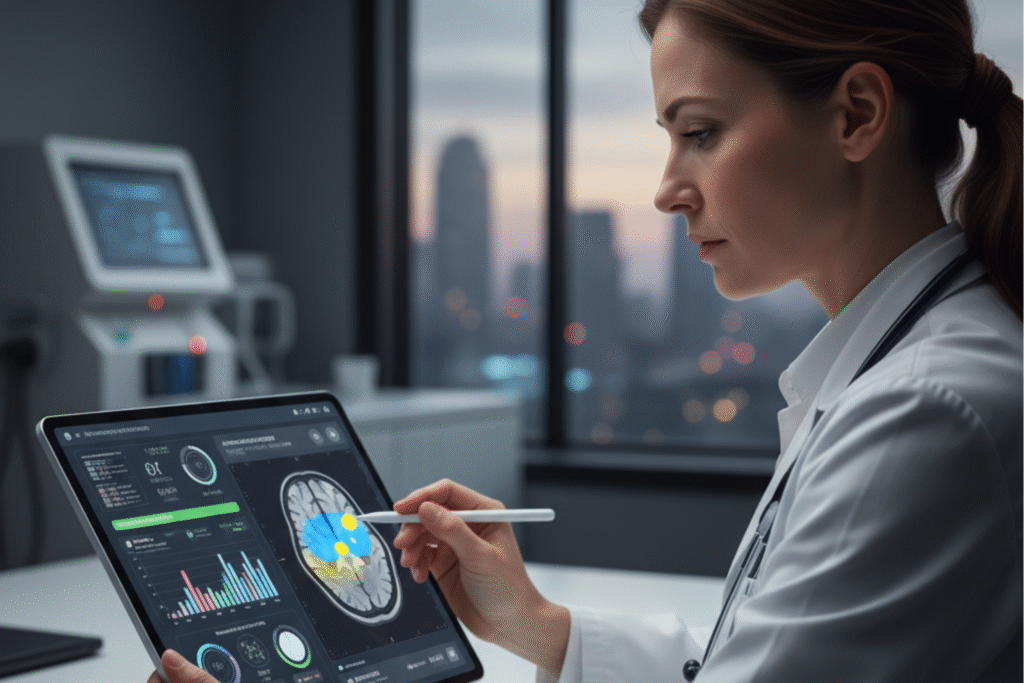
Machine learning algorithms are trained on vast datasets of medical records, enabling them to identify subtle patterns that humans might miss.
For example, AI disease detection can detect early signs of cancer, Alzheimer’s, or heart disease by analyzing patient histories and imaging data.
In oncology, AI models can identify malignant cells in pathology slides with up to 95% accuracy, significantly improving early detection rates.
Predictive Analytics and Preventive Healthcare
AI powered predictive models assess the likelihood of disease development based on lifestyle, genetics, and medical history.
Hospitals now use these systems to predict the onset of chronic conditions such as diabetes or hypertension before symptoms appear.
This proactive approach helps patients make lifestyle changes and receive preventive treatment sooner.
AI in Medical Imaging: AI disease detection
Artificial intelligence has found one of its most impactful and successful uses in the field of medical imaging within healthcare.
Advanced systems like Google DeepMind’s AI for eye disease detection or IBM Watson’s oncology imaging models have demonstrated how AI can analyze radiology scans faster and with fewer errors than human radiologists.
AI in radiology helps detect:
-
- Tumors in mammograms and CT scans
-
- Early-stage lung diseases
-
- Brain abnormalities through MRI data
By combining deep learning and computer vision, AI can reveal microscopic changes invisible to the naked eye, allowing for earlier and more accurate diagnoses.
Real-World Examples and Case Studies in AI disease detection.
Google’s DeepMind for Ophthalmology.
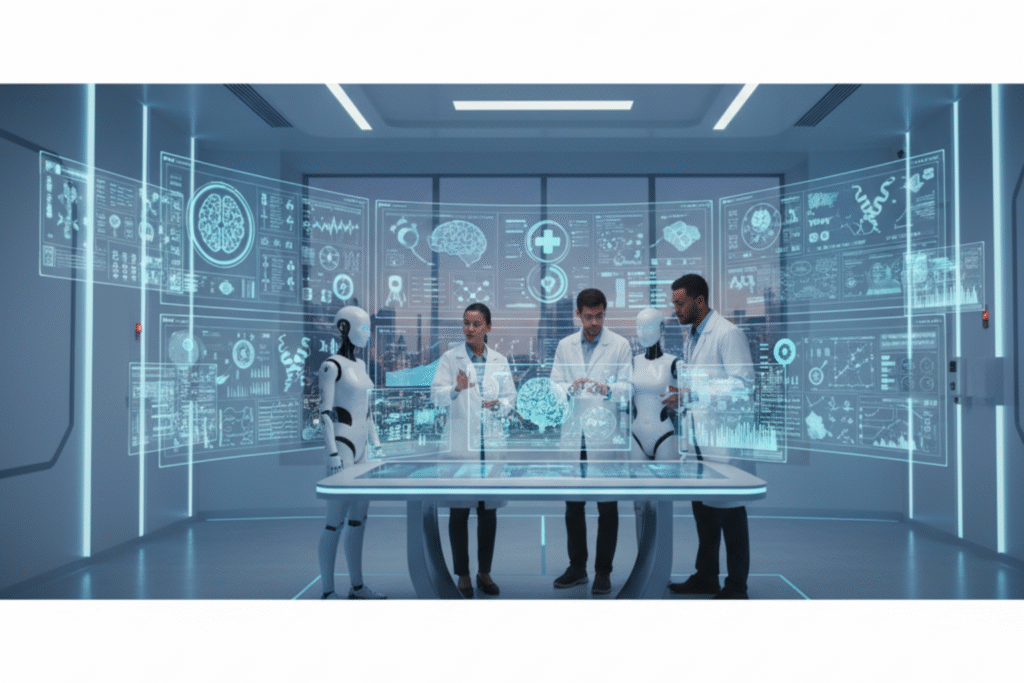
DeepMind’s AI system analyzes retinal scans to detect over 50 different eye diseases with accuracy comparable to top specialists. This allows early treatment and prevents vision loss.
PathAI in Cancer AI disease detection
PathAI’s machine learning models help pathologists diagnose cancers more accurately, reducing human error and speeding up treatment decisions.
Zebra Medical Vision
This Israeli startup uses AI to read medical imaging data and has developed algorithms for over 40 different medical conditions, making early diagnosis more accessible worldwide.
Ethical and Practical Challenges of AI disease detection
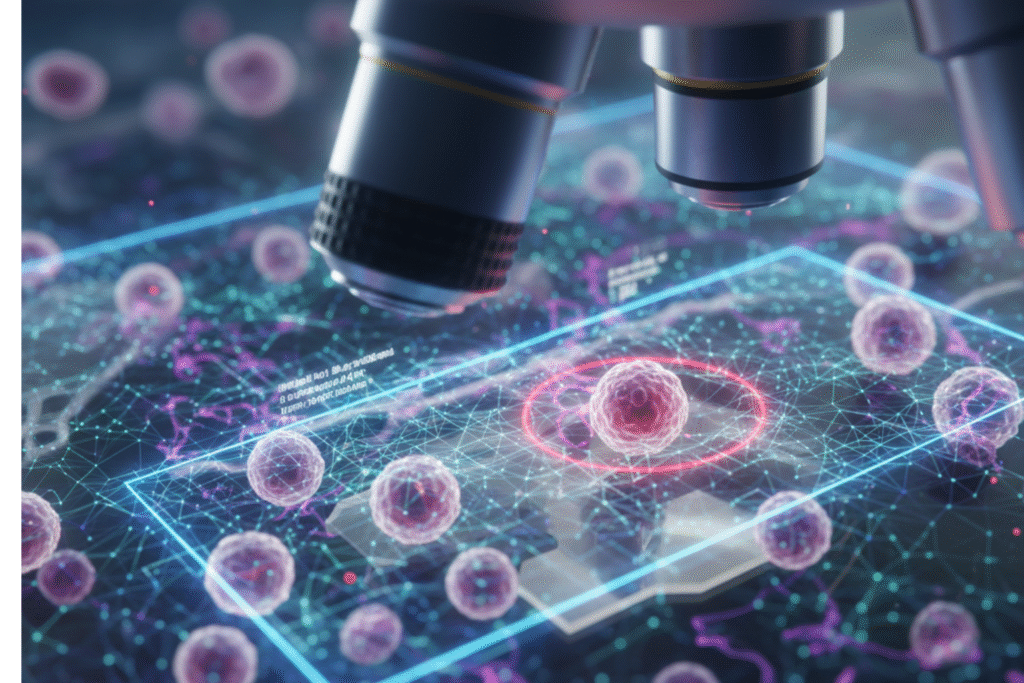
While AI brings immense promise, it also introduces serious challenges.
-
- Data Privacy: Sensitive medical data must be protected from misuse.
-
- Algorithmic Bias: AI systems trained on limited or biased datasets can produce inaccurate results.
-
- Transparency: Doctors must understand how AI reaches its conclusions to ensure trust and accountability.
Healthcare professionals and policymakers are now working to create ethical AI frameworks that balance innovation with patient safety and data privacy.
The Future of in Early AI Disease Detection
AI’s role in healthcare is expanding rapidly. In the near future, we’ll see:
-
- Wearable devices powered by AI that monitor health in real time.
-
- Personalized treatment plans based on predictive analytics.
-
- Global healthcare accessibility through AI powered telemedicine.
As technology evolves, AI in early disease detection will become not just a medical advantage but a global necessity, bridging the gap between diagnosis and prevention and saving countless lives along the way.
The Growing Role of Early AI Disease Detection
How AI Identifies Hidden Patterns in Patient Data
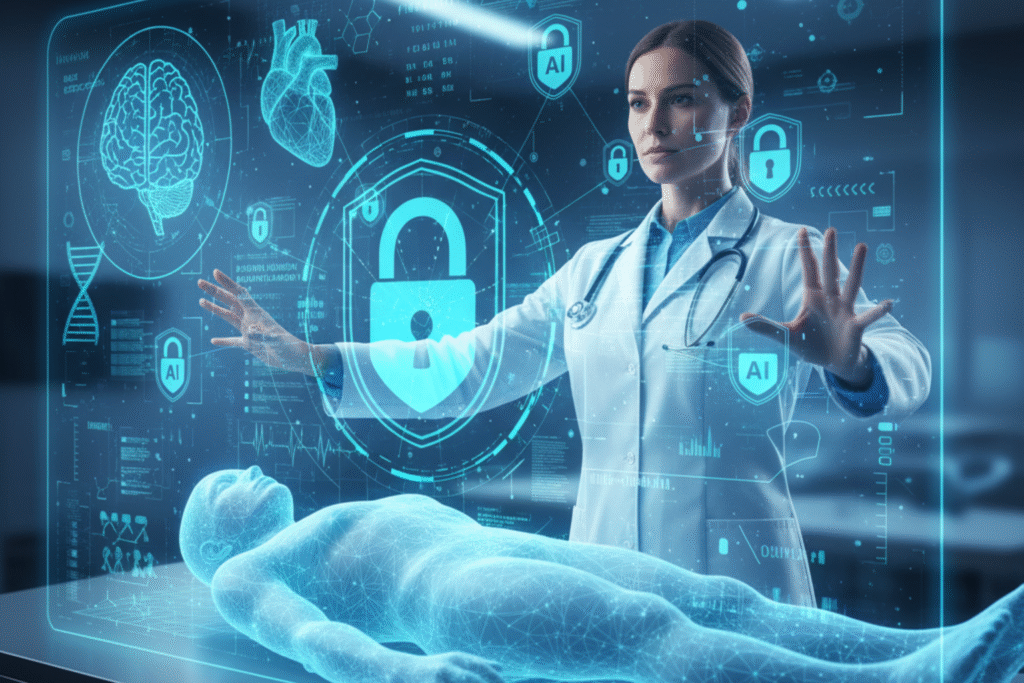
AI systems analyze massive datasets such as lab results, genetic profiles, and medical histories to detect patterns invisible to humans. By using machine learning algorithms, these systems can predict potential illnesses long before symptoms develop, offering doctors a head start in patient care.
AI’s Impact on Speed and Diagnostic Accuracy
Traditional diagnostics can take days or even weeks. With AI, the process is faster and more precise. Algorithms can process thousands of medical images or test results in seconds, helping doctors make better-informed decisions and reducing diagnostic errors.
Machine Learning and Predictive Analytics in Medicine
Using Predictive Models to Prevent Diseases
Predictive analytics powered by AI evaluates a patient’s risk based on genetic data, lifestyle, and previous conditions. Hospitals now use these systems to forecast potential health threats like diabetes, heart disease, or stroke before they become life threatening.
Personalized Healthcare Through AI Insights
AI doesn’t just detect diseases it personalizes prevention. By analyzing individual patient data, AI systems recommend tailored treatments and lifestyle changes, leading to more effective and sustainable healthcare outcomes.
AI-Powered Medical Imaging and Diagnostic Innovation
Transforming Radiology and Pathology
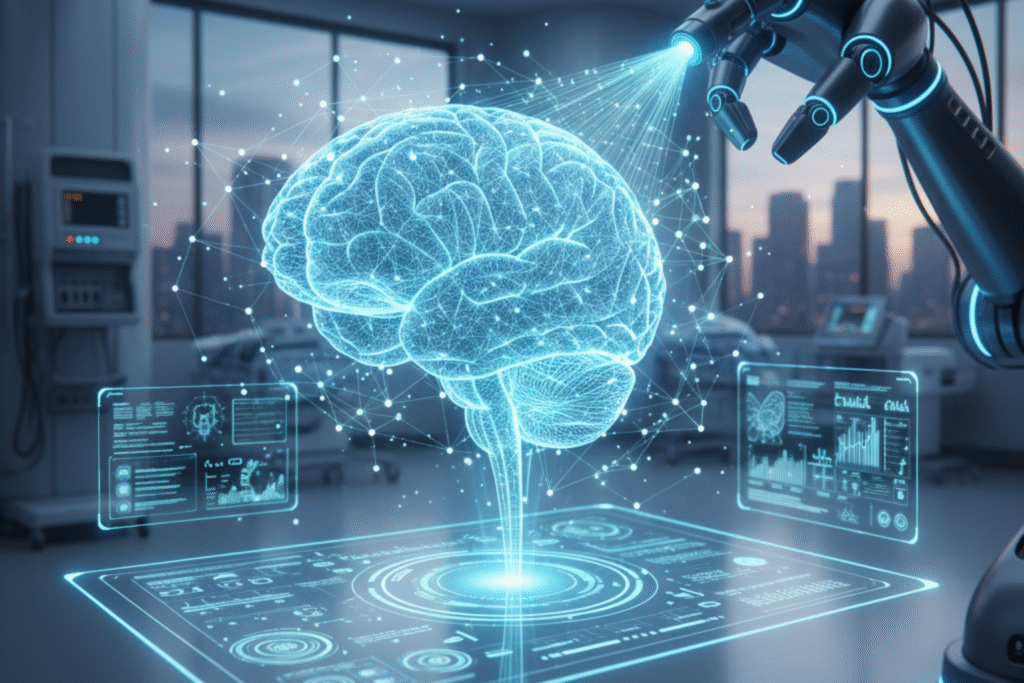
AI-powered imaging tools are revolutionizing radiology by detecting tumors, fractures, and organ anomalies faster and more accurately than ever. Systems like Google’s DeepMind and PathAI assist doctors in identifying early signs of cancer and neurological disorders with remarkable precision.
Real-World Applications Saving Lives
Hospitals worldwide now use AI imaging systems to improve diagnostic accuracy and reduce waiting times. These innovations not only enhance patient outcomes but also ease the workload of overburdened medical professionals making healthcare smarter, faster, and more efficient.
Conclusion

Artificial Intelligence is rapidly redefining how healthcare professionals detect and diagnose diseases. From AI powered medical imaging that spots abnormalities earlier than ever before to predictive analytics that identify risks before symptoms arise, these technologies are turning reactive medicine into proactive care. Real-world examples like DeepMind, PathAI, and Zebra Medical Vision show that AI can enhance accuracy, speed, and patient outcomes while supporting, not replacing, doctors.
As AI continues to advance, its role in early disease detection and diagnosis will only grow stronger. The future of healthcare lies in combining human compassion with machine precision.
Takeaway: Embrace AI as a partner in innovation. Whether you’re a healthcare professional, researcher, or patient advocate, staying informed about AI’s capabilities today will help you to shape a healthier, smarter tomorrow.
